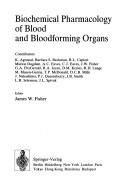| Listing 1 - 2 of 2 |
Sort by
|

ISBN: 354052844X 038752844X 3642758673 3642758657 Year: 1992 Volume: vol 101 Publisher: Berlin New York Barcelona Springer-Verlag
Abstract | Keywords | Export | Availability | Bookmark
 Loading...
Loading...Choose an application
- Reference Manager
- EndNote
- RefWorks (Direct export to RefWorks)
Erythropoietin --- Erythropoietine --- Erytropoetine --- Facteurs de croissance hématopoïétiques --- Hematopoese --- Hematopoiese --- Hematopoiesis --- Hematopoietic growth factors --- Hematopoëtische groeifactoren --- Anemia --- Blood --- Hematopoietic Cell Growth Factors --- Hematopoietic cell growth factors --- Hematopoietins --- HGF (Growth factors) --- Growth factors --- Blood formation --- Hemopoiesis --- Colony-stimulating factors (Physiology) --- blood. --- drug effects. --- pharmacology. --- Erythropoietin. --- Hematopoiesis. --- Hematopoietic growth factors. --- ANEMIA --- BLOOD --- HEMATOPOIESIS --- HEMATOPOIETIC CELL GROWTH FACTORS --- blood --- drug effects --- pharmacology --- Blood. --- Drug effects. --- Pharmacology.

ISSN: 10780491 ISBN: 9780306452383 0306452383 9780585317281 1475770529 0585317283 Volume: v. 7 Publisher: New York, NY.
Abstract | Keywords | Export | Availability | Bookmark
 Loading...
Loading...Choose an application
- Reference Manager
- EndNote
- RefWorks (Direct export to RefWorks)
Historically, the field of hematopoietic growth factor research began with the work of Carnot and Deflandre-in 1906 they suggested that the rate of erythropoiesis is regulated by a humoral factor found in the blood, namely, erythropoietin. From this comparatively early start, accelerating progress has been made in erythropoietin research, which demon strates the general trends in this field of study. Erythropoietin was purified to homogeneity by 1977 (from enormous quantities of urine from aplastic anemia patients). Subsequently, the gene for erythropoietin has been cloned (1985), and massive quantities of this growth factor have been produced for clinical trials (late 1980s onward). Erythropoietin has become established as a pharmaceutical product of great value in the treatment of a number of diseases, most notably chronic renal failure. Once the ligand had been cloned, interest turned to the erythropoietin receptor, which was cloned in 1989. Since then, structure/ function studies have been performed on receptor mutants, cellular signaling events down stream from the occupied receptor have been identified, and the specific producer cell types and molecular stimuli for erythropoietin production have been thoroughly investigated, as has the regulation of erythropoietin gene transcription. This schedule of events since the 1970s typifies that seen for a number of hematopoietic growth factors. Along the way, the hematopoietic growth factors have been recognized as members of the cytokine family of signaling molecules that are important in a number of different physiological and patholog ical situations (see below).
Hematopoietic Cell Growth Factors --- Receptors, Growth Factor --- Blood Cells --- Erythropoietin --- Blood cells --- Hematopoietic growth factors. --- Erythropoïétine --- physiology. --- therapeutic use. --- immunology. --- immunology --- Biochemistry. --- Cell Biology. --- 57 --- Cellular Biology --- Cytology --- Biologies, Cell --- Biologies, Cellular --- Biology, Cell --- Biology, Cellular --- Cell Biologies --- Cellular Biologies --- Biological sciences in general --- Periodicals --- Health Sciences --- Physiology --- Biochemistry --- Cell Biology --- Oncology . --- Hematology. --- Immunology. --- Human genetics. --- Oncology. --- Biochemistry, general. --- Human Genetics. --- Blood cells.
| Listing 1 - 2 of 2 |
Sort by
|

 Search
Search Feedback
Feedback About UniCat
About UniCat  Help
Help News
News